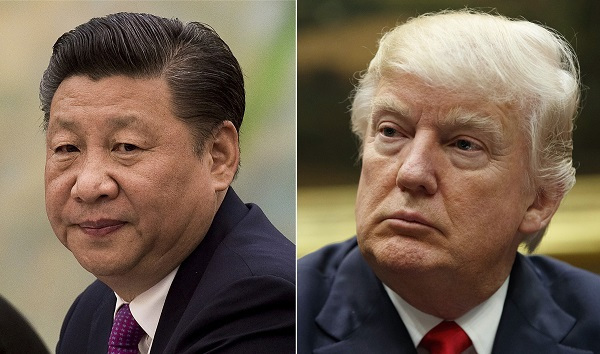[News Analysis] NK seeks to steal show ahead of Trump-Xi summit
By Shin Hyon-heePublished : April 5, 2017 - 16:11
With its latest missile test, North Korea appears to be seeking to overshadow a summit between the leaders of the US and China, putting their relationship to a first, crucial test.
Presidents Donald Trump and Xi Jinping are set to meet in Florida from Thursday, and how to deal with the North’s nuclear and missile programs is expected to take center stage.
The timing could be particularly troubling for Xi, who would not want to be seen as protecting mercurial young leader Kim Jong-un in the face of mounting pressure from Washington.
The Trump administration is currently carrying out a North Korea policy overhaul and has been signaling it plans to take a much tougher line.
Presidents Donald Trump and Xi Jinping are set to meet in Florida from Thursday, and how to deal with the North’s nuclear and missile programs is expected to take center stage.
The timing could be particularly troubling for Xi, who would not want to be seen as protecting mercurial young leader Kim Jong-un in the face of mounting pressure from Washington.
The Trump administration is currently carrying out a North Korea policy overhaul and has been signaling it plans to take a much tougher line.

Ahead of the gathering, Trump has threatened to use trade to press Beijing to do more to restrain the North’s nuclear and missile development, or else resolve the issue on its own. On Tuesday, he once again pointed to the US’ annual trade deficit with China amounting to $504 billion.
US Secretary of State Rex Tillerson has also floated the possibility of military action to counter the threats during his recent visit to Seoul, though its prospects remain bleak given risks of escalation and other difficulties. “The US has spoken enough about North Korea. We have no further comment,” he said in a statement shortly after the newest provocation.
During a media briefing on the summit Tuesday, a senior White House official said, “The clock has now run out and all options are on the table.”
Beijing, while vexed by its defiant neighbor’s relentless provocations, insists Washington should engage in dialogue and do its part to ease Pyongyang’s security concerns.
In addition to dampening the mood for the leaders’ first face-to-face encounter, the test will likely highlight differences between the two countries, officials and analysts say.
“I don’t expect the two presidents will come up with a compromise in one way or another during the summit, but the North Korea issue may mean a first test for the relationship between not only the two countries under Trump but the leaders themselves,” a Seoul official said, requesting anonymity due to the sensitivity of the matter.
Another official said, “North Koreans are apparently trying to remind the world that its resolve for nuclear and missile development remains unfaltering and it will not change whatever the two leaders talk about.”
Kim Dong-yub, a professor at Kyungnam University’s Institute for Far Eastern Studies, echoed the view, saying it represents Pyongyang’s determination to “go its own way.”
Speculation has been rising that the Kim regime may conduct another nuclear test or fire an intercontinental ballistic missile after the summit, partly to celebrate upcoming major national events, including the birth of founder Kim Il-sung, a ruling party assembly and the anniversary of the creation of its military.
But even a larger-scale provocation would be unlikely to lead to a fresh bargain between Washington and Beijing or a sweeping change in either side’s policy, said David Straub, who formerly worked for the Korea Desk at the US State Department.
Still, it may influence Trump’s personal impressions and prompt his administration to further pressure China to better enforce the existing sanctions and punish more Chinese businesses involved in transactions with North Korea, he noted.
“(Possible US actions) will include a significant amount of secondary sanctions on Chinese companies dealing with North Korea, especially if the meeting between Trump and Xi does not result in China taking a significantly different approach,” Straub, who now works as a visiting fellow at the Sejong Institute here, said in a recent interview.
“I strongly doubt that it would fundamentally change the Chinese thinking. But if it makes Trump very upset and it makes the Chinese even unhappier, it’s possible it could have some significant impact on the future course of US policy and also Chinese policy.”
By Shin Hyon-hee (heeshin@heraldcorp.com)








![[Graphic News] More Koreans say they plan long-distance trips this year](http://res.heraldm.com/phpwas/restmb_idxmake.php?idx=644&simg=/content/image/2024/04/17/20240417050828_0.gif&u=)
![[KH Explains] Hyundai's full hybrid edge to pay off amid slow transition to pure EVs](http://res.heraldm.com/phpwas/restmb_idxmake.php?idx=644&simg=/content/image/2024/04/18/20240418050645_0.jpg&u=20240419100350)







![[KH Explains] Hyundai's full hybrid edge to pay off amid slow transition to pure EVs](http://res.heraldm.com/phpwas/restmb_idxmake.php?idx=652&simg=/content/image/2024/04/18/20240418050645_0.jpg&u=20240419100350)

![[Today’s K-pop] Illit drops debut single remix](http://res.heraldm.com/phpwas/restmb_idxmake.php?idx=642&simg=/content/image/2024/04/19/20240419050612_0.jpg&u=)